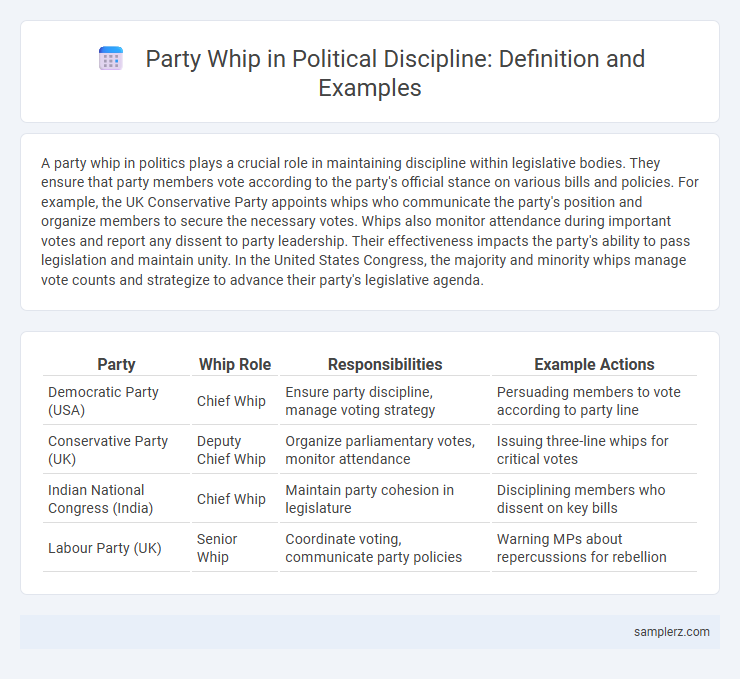A party whip in politics plays a crucial role in maintaining discipline within legislative bodies. They ensure that party members vote according to the party's official stance on various bills and policies. For example, the UK Conservative Party appoints whips who communicate the party's position and organize members to secure the necessary votes. Whips also monitor attendance during important votes and report any dissent to party leadership. Their effectiveness impacts the party's ability to pass legislation and maintain unity. In the United States Congress, the majority and minority whips manage vote counts and strategize to advance their party's legislative agenda.
Table of Comparison
| Party | Whip Role | Responsibilities | Example Actions |
|---|---|---|---|
| Democratic Party (USA) | Chief Whip | Ensure party discipline, manage voting strategy | Persuading members to vote according to party line |
| Conservative Party (UK) | Deputy Chief Whip | Organize parliamentary votes, monitor attendance | Issuing three-line whips for critical votes |
| Indian National Congress (India) | Chief Whip | Maintain party cohesion in legislature | Disciplining members who dissent on key bills |
| Labour Party (UK) | Senior Whip | Coordinate voting, communicate party policies | Warning MPs about repercussions for rebellion |
Role of Party Whip in Maintaining Party Discipline
The party whip plays a crucial role in maintaining party discipline by ensuring that members vote according to the party line, preventing defections and fostering unity during parliamentary sessions. By coordinating communication between party leadership and legislators, the whip enforces compliance with party policies and sanctions dissenting members when necessary. This role is essential for upholding legislative cohesion and advancing the party's strategic political agenda.
Historical Examples of Party Whip Enforcement
During the 19th century British Parliament, party whip enforcement was crucial in maintaining party unity, exemplified by Benjamin Disraeli's strict management of Conservative MPs to secure key votes. The U.S. Congress has seen notable instances such as Speaker Tip O'Neill's effective use of whips during the 1980s to ensure Democratic cohesion on significant legislation like the Reagan-era budget battles. In India, Indira Gandhi's Congress party utilized the whip system intensively during the Emergency period (1975-1977) to suppress dissent and enforce loyalty within the party ranks.
Notable Incidents of Party Whip Intervention
In 2010, the UK Conservative Party whip was withdrawn from rebel MPs who voted against the government's austerity measures, emphasizing strict party discipline. The 2015 Australian Labor Party saw the whip enforced when members opposed key budget bills, resulting in suspensions and loss of party privileges. During the 2021 US Congress voting on infrastructure bills, the Democratic Party whip applied intense pressure on swing votes to maintain party cohesion and secure legislative passage.
Mechanisms Party Whips Use to Enforce Discipline
Party whips enforce discipline through mechanisms such as vote counting, issuing warnings, and coordinating party member attendance during key votes. They employ communication channels to ensure members adhere to party policies and may use incentives like committee assignments or sanctions including removal from party positions. These strategies maintain cohesion and prevent dissent that could undermine party objectives in legislative processes.
Case Studies: Whip Discipline in Parliamentary Systems
The British Conservative Party's enforcement of whip discipline during the 2019 Brexit votes demonstrates stringent measures to ensure party cohesion by issuing three-line whips and threatening suspension for dissenters. Similarly, the Indian Lok Sabha regularly employs the "anti-defection law" alongside whip instructions to maintain party discipline, leading to disqualification of members voting against party lines. These case studies highlight how whip systems are pivotal in preserving legislative unity and advancing party agendas within parliamentary democracies.
Impact of Party Whip on Voting Cohesion
Party whips significantly enhance voting cohesion by enforcing party discipline and ensuring members align with the party's legislative agenda. This strategic role minimizes dissent in parliamentary votes, leading to more predictable and unified policy outcomes. Effective whipping mechanisms contribute to the stability of majority governments and reinforce party loyalty among legislators.
Famous Instances of MP Defiance and Whip Response
Party whips enforce discipline by ensuring MPs vote according to party lines, sometimes facing defiance that tests their authority. Notable instances include the 2019 Brexit vote where Conservative MPs defied the whip, leading to suspensions and resignations to maintain party cohesion. The whip's firm responses highlight the critical balance between individual MP conscience and collective party strategy in parliamentary politics.
Whip System in Different Political Parties
The Whip system in political parties enforces discipline by ensuring members vote according to party lines, with the British Conservative Party exemplifying strict adherence through formal warnings and sanctions. In contrast, the Indian National Congress employs a more flexible approach, balancing party directives with individual member autonomy. These variations highlight the strategic role of Whips in maintaining cohesion and influencing legislative outcomes across different democratic frameworks.
Party Whip Influence During Crucial Legislation
Party whips play a critical role in enforcing discipline during crucial legislation by ensuring party members vote according to the party line, thereby maintaining unity. Their influence is evident in key votes such as the Affordable Care Act passage in the U.S., where the Democratic Whip secured necessary support through strategic persuasion and negotiation. Effective party whip control can determine the success or failure of significant policy measures by minimizing defections and consolidating legislative power.
Consequences Faced by MPs Breaking Party Discipline
MPs breaking party discipline often face severe consequences such as loss of committee positions, suspension from the party, or even expulsion. Party whips enforce unity by monitoring voting behavior and applying pressure to conform, ensuring legislative coherence. These disciplinary measures maintain party stability and influence parliamentary decision-making.

example of party whip in discipline Infographic
 samplerz.com
samplerz.com